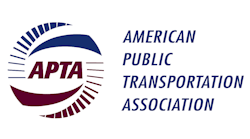FY23 Omnibus legislative package includes $21.2 billion for public transit and $16.6 billion for passenger and freight rail
The bipartisan Consolidated Appropriations Act, 2023, includes $21.2 billion for public transit and $16.6 billion for passenger and freight rail, according to the American Public Transportation Association (APTA) The bicameral agreement on Fiscal Year (FY) 2023 appropriations legislation includes the Transportation, Housing and Urban Development, and Related Agencies Appropriations Act, 2023 (THUD Appropriations bill). The THUD Appropriations bill appropriates the majority of public transit and passenger rail authorizations of the Infrastructure Investment and Jobs Act (IIJA).
“We are encouraged to see Congress honor the promise of the bipartisan Infrastructure Investment and Jobs Act by providing this funding for public transit and passenger rail for Fiscal Year 2023,” said Paul P. Skoutelas, APTA president and CEO. “This is a transformational investment in public transportation infrastructure our country so desperately needs. These historic and generational investments will enable communities to provide access to opportunities and create family-wage jobs, advance equity, tackle climate change and meet growing and evolving mobility demands.”
Specifically, the THUD Appropriations bill, together with the IIJA’s advance appropriations, provides a total of $21.2 billion for public transit in FY 2023, an increase of $704 million from the FY 2022 enacted level. In addition, the THUD Appropriations bill and IIJA provide $16.6 billion for passenger and freight rail in FY 2023, an increase of $69 million from the FY 2022 enacted level.
Key public transit and passenger rail details contained in the THUD Appropriations bill
- The bill fully funds the public transit contract authority of $13.6 billion, as provided by the IIJA.
- The bill, together with the IIJA advance appropriations, provides $4.2 billion for Capital Investment Grants (CIG), $387 million more than the FY 2022 enacted level.
- The bill’s $2.6 billion CIG appropriation includes $1.8 billion for New Starts, $100 million for Core Capacity projects, $215 million for Small Starts, $100 million for the Expedited Project Delivery for CIG Pilot Program and an additional $425 million for projects with existing Full Funding Grant Agreements.
- The bill blocks the Rostenkowski Test, preventing a possible across-the-board cut of FY 2023 transit formula funds to each public transit agency.
- The bill provides $3.4 billion for passenger rail investments, including $2.5 billion for Amtrak grants ($1.2 billion for National Network grants and $1.3 billion for the Northeast Corridor), $560 million for Consolidated Rail Infrastructure and Safety Improvement (CRISI) grants, and $100 million for Federal-State Partnership for Intercity Passenger Rail grants.
- The bill provides $25 million for specific CRISI projects and allows CRISI grants to be used for commuter railroad projects that implement or sustain positive train control systems.
- The bill provides $800 million for RAISE grants in FY 2023, which is $25 million more than the FY 2022 enacted level.
In addition, APTA advocated for several other key pieces of the Consolidated Appropriations bill, including:
- Division N, Title X of the Consolidated Appropriations bill provides $214 million for FTA’s Public Transportation Emergency Relief Program for public transit systems affected by major declared disasters occurring in calendar years 2017, 2020, 2021 and 2022.
- Division O, Title X, Section 1001 of the Consolidated Appropriations bill waives the Statutory Pay-as-You-Go-Act of 2010 (PAYGO) for FY 2023 and FY 2024. Waiving Statutory PAYGO ensures the federal government continues to make Build America Bonds (BABs) subsidy payments to fulfill its commitments to public transit agencies that issued BABs.




